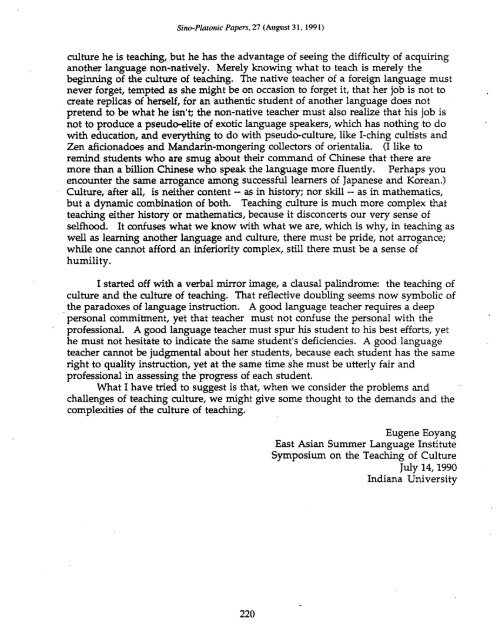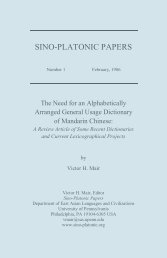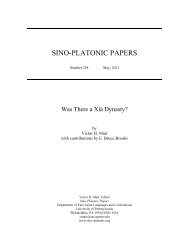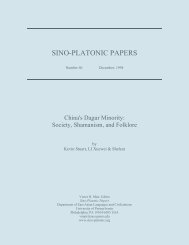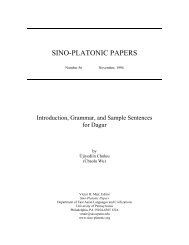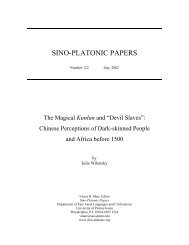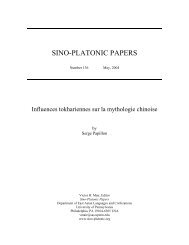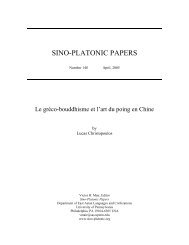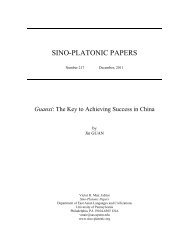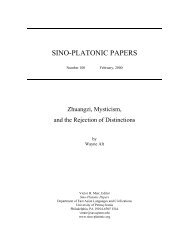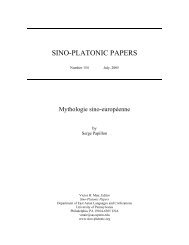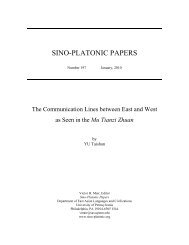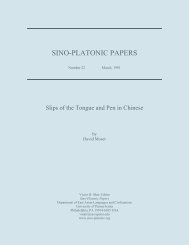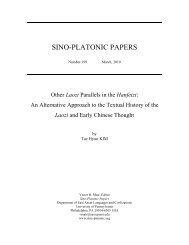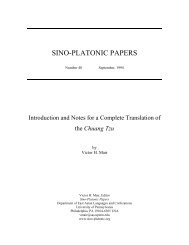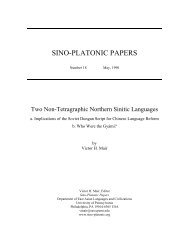Essays on Writing and Language in Honor - Sino-Platonic Papers
Essays on Writing and Language in Honor - Sino-Platonic Papers
Essays on Writing and Language in Honor - Sino-Platonic Papers
You also want an ePaper? Increase the reach of your titles
YUMPU automatically turns print PDFs into web optimized ePapers that Google loves.
S<strong>in</strong>o-Plut<strong>on</strong>ic <strong>Papers</strong>, 27 (August 3 1, 1991)<br />
culture he is teach<strong>in</strong>g, but he has the advantage of see<strong>in</strong>g the difficulty of acquir<strong>in</strong>g<br />
another language n<strong>on</strong>-natively. Merely know<strong>in</strong>g what to teach is merely the<br />
beg<strong>in</strong>n<strong>in</strong>g of the culture of teach<strong>in</strong>g. The native teacher of a foreign language must<br />
never forget, tempted as she might be <strong>on</strong> occasi<strong>on</strong> to forget it, that her job is not to t<br />
create replicas of herself, for an authentic student of another language does not<br />
pretend to be what he isn't; the n<strong>on</strong>-native teacher must also realize that his job is<br />
not to produce a pseudoslite of exotic language speakers, which has noth<strong>in</strong>g to do<br />
with educati<strong>on</strong>, <strong>and</strong> everyth<strong>in</strong>g to do with pseudo-culture, like I-ch<strong>in</strong>g cultists <strong>and</strong><br />
Zen afici<strong>on</strong>adoes <strong>and</strong> M<strong>and</strong>ar<strong>in</strong>-m<strong>on</strong>ger<strong>in</strong>g collectors of orientalia. (I like to<br />
rem<strong>in</strong>d students who are smug about their comm<strong>and</strong> of Ch<strong>in</strong>ese that there are<br />
more than a billi<strong>on</strong> Ch<strong>in</strong>ese who speak the language more fluently. Perhaps you<br />
encounter the same arrogance am<strong>on</strong>g successful learners of Japanese <strong>and</strong> Korean.)<br />
Culture, after all, is neither c<strong>on</strong>tent - as <strong>in</strong> history; nor skill - as <strong>in</strong> mathematics,<br />
but a dynamic comb<strong>in</strong>ati<strong>on</strong> of both. Teach<strong>in</strong>g culture is much more complex that<br />
teach<strong>in</strong>g either history or mathematics, because it disc<strong>on</strong>certs our very sense of<br />
selfhood. It c<strong>on</strong>fuses what we know with what we are, which is why, <strong>in</strong> teach<strong>in</strong>g as<br />
well as learn<strong>in</strong>g another language <strong>and</strong> culture, there must be pride, not arrogance;<br />
while <strong>on</strong>e cannot afford an <strong>in</strong>feriority complex, still there must be a sense of<br />
humility.<br />
I started off with a verbal mirror image, a clausal pal<strong>in</strong>drome: the teach<strong>in</strong>g of<br />
culture <strong>and</strong> the culture of teach<strong>in</strong>g. That reflective doubl<strong>in</strong>g seems now symbolic of<br />
the paradoxes of language <strong>in</strong>structi<strong>on</strong>. A good language teacher requires a deep<br />
pers<strong>on</strong>al commitment, yet that teacher must not c<strong>on</strong>fuse the pers<strong>on</strong>al with the<br />
professi<strong>on</strong>al. A good language teacher must spur his student to his best efforts, yet<br />
he must not hesitate to <strong>in</strong>dicate the same student's deficienaes. A good language<br />
teacher cannot be judgmental about her students, because each student has the same<br />
right to quality <strong>in</strong>structi<strong>on</strong>, yet at the same time she must be utterly fair <strong>and</strong><br />
professi<strong>on</strong>al <strong>in</strong> assess<strong>in</strong>g the progress of each student.<br />
What I have tried to suggest is that, when we c<strong>on</strong>sider the problems <strong>and</strong><br />
challenges of teach<strong>in</strong>g culture, we might give some thought to the dem<strong>and</strong>s <strong>and</strong> the<br />
complexities of the culture of teach<strong>in</strong>g.<br />
Eugene Eoyang<br />
East Asian Summer <strong>Language</strong> Institute<br />
Symposium <strong>on</strong> the Teach<strong>in</strong>g of Culture<br />
July 14,1990<br />
Indiana University


